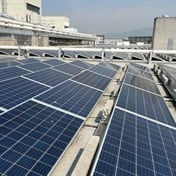
- There's been a renewed focus on the environmental impact of the concert industry.
- Event organisers are focusing more than ever on sustainability.
- Future legislation could force festivals to make more progress.
- For more financial news, go to the News24 Business front page.
On a balmy July weekend, a sea of purple and blue tents stretched across a field in Belgium, providing temporary shelter for nearly 4 000 music lovers from all over the globe. Recycled from abandoned camp gear, the colourful patchwork was part of a push by Tomorrowland, one of Europe’s biggest festivals, to scale back its carbon footprint.
"It’s not only about reducing the huge carbon footprint all at once," said Lori Maes, a coordinator at Belgium-based Camp2Camp, which provided tents and rented out secondhand sleeping bags, air mattresses and chairs to festival goers. "It's about making efforts that, combined together, can make a difference."
With much of the world baking in extreme heat this summer, there’s been a renewed focus on the environmental impact of the concert industry. From Britain's Glastonbury Festival to Coachella in California, event organisers are focusing more than ever on sustainability by planting trees, banning single-use plastic bottles and even ensuring that face glitter is biodegradable.
Living laboratories
Festivals are like "living laboratories because you can try something one year, then you can evaluate, and the following year you can try something new," said Holger Jan Schmidt, general secretary at Yourope - The European Festival Association. "Festivals can also act as a motivator given that they appeal to a large group of young people."
Held for two weekends each summer in the Belgian town of Boom, Tomorrowland draws roughly 400 000 fans of electronic dance music from over 200 countries. Tapio, a Brussels-based consultancy, estimates that the festival emits almost 150 000 metric tons of carbon dioxide equivalent due to the air travel, merchandise and food involved. That's roughly on par with the annual emissions footprint of 9300 Belgians.
This year, efforts to improve sustainability were evident across Tomorrowland's sprawling site, which played host to 16 stages and some 750 musical acts. The festival expanded its electricity grid in order to halve its use of diesel generators, and affiliated nonprofit Love Tomorrow staged a parallel conference with workshops to discuss sustainability.
The festival had a strong focus on recycling, with purple bins that let attendees sort food, plastics and general waste. Employees and volunteers also collected refuse in bins strapped to their backs, and some food stalls experimented with edible straws and cups. Campers who brought sorted waste to a collection area were eligible for prizes that included earplugs, reusable water bottles and socks made from recycled yarns.
"Climate change is everywhere, and we are trying our best," said Sarah Campbell, a festival goer from Ireland who stayed in Tomorrowland's village, known as Dreamville. "But you can't rob yourself of life and experiences. If every single person here recycles their cups, it makes already a huge difference."
Party flights
Tomorrowland is tackling some of its environmental pitfalls head-on: According to Tapio, 21% of the festival's emissions come from sales of meals, beverages, merchandise and other goods. But 79% of Tomorrowland emissions are associated with transportation, where reductions are more difficult. The festival received criticism for a tie-in with Brussels Airlines that included 10 500 flight packages, some of them "party flights" with live DJ sets.
"Tomorrowland means the land of tomorrow," said Tapio Chief Executive Officer Louis Collinet. "But this land will not exist if we do not take into account the climate impact."
Tomorrowland spokesperson Debby Wilmsen pointed to the festival’s international nature as a big factor in its transportation footprint. "If we do not provide for a flight for people to come, festival goers would still book a flight, just with another company," she said.
Tomorrowland also disputes the findings of the Tapio report, which Wilmsen says were drawn "without any facts or insights from our side." The festival is hiring a consultancy to do a separate assessment, with plans to publish data later this year. Tapio, which creates carbon-reduction plans for businesses, says its findings are more "symbolic" than exact.
Ahead of the game
Many festivals are looking for ways to reduce emissions. The Paradise City Festival in Belgium partnered with local company Aquafin to treat wastewater from toilets so it can be released back into nature. Dutch festival Lowlands, which hosts about 60 000 alternative music fans each year, partnered with developer Solarfields to put solar panel roofing over a 35-hectare parking lot.
Glastonbury, with a capacity of 210 000, was fully powered by renewable energy this year. The festival committed to monitoring the quality of water in local rivers and has planted more than 10 000 native trees and hedges directly. Coachella has a prize draw for festival goers who organise carpools and requires all food vendors to use compostable plates, cups and utensils.
"Music festivals are like a mini town, in some cases even a mini city because of their scale," said Teresa Moore, director of the environmental nonprofit A Greener Future, who thinks future legislation could force festivals to make more progress. "Those events who are already making these changes are ahead of the game. Those who have not started need to get going, because otherwise they will find themselves running to catch up."




 Publications
Publications
 Partners
Partners












